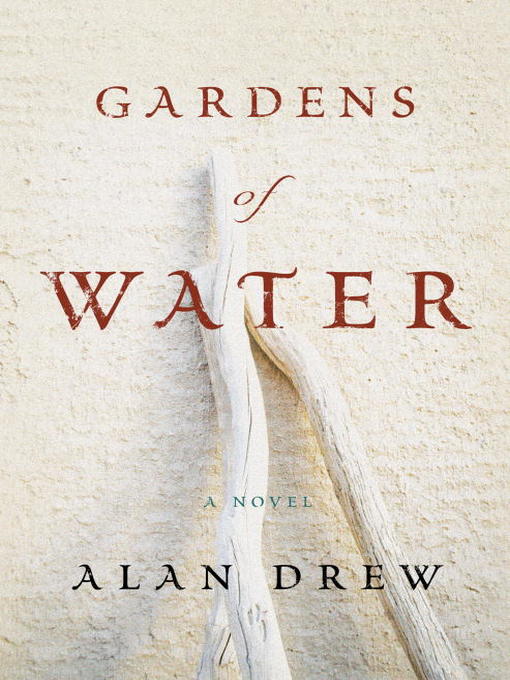
Gardens of Water
A Novel
فرمت کتاب
ebook
تاریخ انتشار
2008
Reading Level
4-5
ATOS
6
Interest Level
9-12(UG)
نویسنده
Alan Drewشابک
9781588366801
کتاب های مرتبط
- اطلاعات
- نقد و بررسی
- دیدگاه کاربران
نقد و بررسی

October 15, 2007
In Drew’s well-intentioned if overwrought first novel, cultures clash as a teenaged Kurdish girl and an American boy fall in love over the objection of the girl’s father, a Muslim Kurd living in Istanbul. Sinan, a shop owner, tries to keep his American upstairs neighbors, Marcus Hamm and his family, at arm’s length. But this is impossible after an earthquake devastates Istanbul, and Sinan and his family end up living in a tent city provided by American missionaries. Marcus, the director of a missionary school, lost his wife in the earthquake; she was found dead, shielding Sinan’s son, who was buried alive for three days before being rescued. Now, Sinan watches as his America-obsessed daughter, Irem, falls in love with Marcus’s bipolar son, Dylan, and his impressionable younger son, Ismail, slowly becomes converted to Christianity at the camp. The story moves inexorably toward a climax in which Sinan’s Muslim pride and Marcus’s Christian proselytizing collide with predictably tragic results. Though some may find the ideological conflict that provides the narrative thrust too textbookish, Drew, who lived in Istanbul at the time of the Marmara earthquake, effortlessly transports readers to a wrecked Istanbul and finds shards of hope in the mountains of rubble.

January 15, 2008
This first novel explores the interactions between two families, one Muslim and the other Christian, in an Istanbul suburb during the earthquake that struck Turkey in 1999. Sinan Basioglu fears the influence of his Christian neighbors, Marcus and Sarah Roberts and their son Dylan, on his son Ismail and daughter Irem. He tries to minimize contact with them, but the earthquake binds the two families together. Ismail is buried in the rubble for hours and presumed dead. He survives miraculously when Sarah Roberts sacrifices her life to let him live. Now indebted to Marcus, the Basioglus are also homeless and forced to stay in the refugee camp he runs. Irem is increasingly drawn toward Dylan, Ismail to Christianity, and the novel quickly builds to its tragic conclusion. Drew occasionally descends into melodrama but in general has produced a fast-paced and well-written narrative, one that convincingly explores the tensions between Islam and Christianity and the seismic cultural shifts that can result from natural disasters. Recommended for larger academic and public libraries. [See Prepub Alert, "LJ" 10/1/07.]Douglas Southard, CRA International Lib., Boston
Copyright 2008 Library Journal, LLC Used with permission.

February 1, 2008
Adult/High School-Set in a small town outside Istanbul after the 1999 earthquake, this remarkable debut novel chronicles the complex relationships within and between American and Kurdish families. United by the illicit romance of Dylan, 17, and Irem, 15, two families cope with the losses presented by the quake and the challenges created by their cultural differences. Dylans father is one of the Christian Americans providing aid in the camp where Irems family has taken refuge. Her father, Sinan, must spend hours away from home working to support his family while also fighting to preserve their values amid incompatible cultural influences. As the relationship between Dylan and Irem develops, Sinans inner struggle between love and honor escalates, causing him to make a devastating decision that will end in tragedy for both families. The power and brilliance of this book lie in the skillfully crafted levels of the plot. Readers will find themselves engaged in Sinans fight to hold his family together while empathizing with Irems desire to redefine herself outside of her conservative Muslim heritage. At the same time, they will be engrossed in the emerging romance while also questioning the motives of the American aid workers in the camp. Sophisticated teens will be further rewarded with the exploration of changing cultural, political, and religious boundaries. This novel will generate a variety of interesting classroom and book club discussions."Lynn Rashid, Marriots Ridge High School, Marriotsville, MD"
Copyright 2008 School Library Journal, LLC Used with permission.

November 15, 2007
Drews first novel takes readers to Turkey, a geographical location not common as a setting in American fiction, and his absorbing narrative is obviously derived from hisown intense experiences in that place. A fresh reworking ofthe Romeo-and-Juliet theme, this version has on one side of the star-crossed equation a Kurdish family driven outof their native Kurdistan region of Turkey by a civil war, now resident ina town just outside Istanbul;on the other side of the equation is an American family living in the same apartment building, and thefather is the director of a missionary school in Istanbul. The Kurdish father is anti-American because of his awareness that the U.S. helped the Turkish government destroy Kurdish villages. But he has a teenage daughter, and in the American family is a teenage son. The cataclysm that precipitates a domestic crisis involving both families is a huge earthquake that rocks the region, forcing people from their homes and into temporary camps. A richly detailed, finely plotted demonstration of culture clash.(Reprinted with permission of Booklist, copyright 2007, American Library Association.)

























دیدگاه کاربران